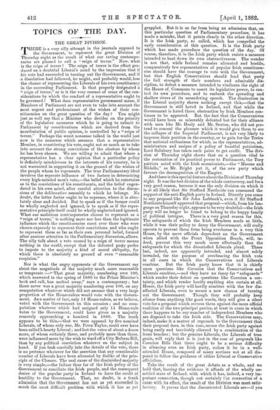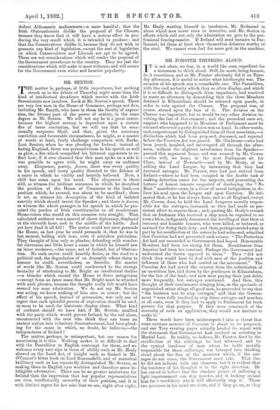TOPICS OF THE DAY.
THE GREAT DIVISION.
THERE is a very silly attempt in the journals opposed to the Government, to represent the great Division of Thursday night as the result of what our raving contempo- raries are pleased to call a "reign of terror." Now, what is the reign of terror ? The reign of terror is the effect pro- duced on a doubtful Liberal's mind by the impression that if his vote had succeeded in turning out the Government, and if a dissolution had followed, he might, and probably would, lose the chance of representing the Liberals of his own constituency in the succeeding Parliament. Is that properly designated a "reign of terror," or is it the very essence of some of the con- siderations by which the conduct of a representative ought to be governed ? What does representative government mean, if Members of Parliament are not even to take into account the most urgent and predominant of the wishes of their con- stituencies on the great question of the day ? You might just as well say that a Minister who decides on the priority of the legislative measures which he is going to submit to Parliament by considerations which are derived from the manifestation of public opinion, is controlled by a "reign of terror." Perhaps the worst nonsense talked in the world just now is the nonsense which assumes that a representative Member, in considering his vote, ought not so much as to take into account the strong convictions of the electors by whom he has been chosen. We are willing to admit that where a representative has a clear opinion that a particular policy is definitely mischievous to the interests of his country, he is not warranted in supporting it on the ground of the wishes of the people whom he represents. The true Parliamentary ideal involves the separate influence of two factors in determining every high-minded man's vote,—the belief which he entertains
as to the convictions of his constituents, and the belief engen- dered in his own mind, after careful attention to the discus- sions of the deliberative assembly to which he belongs. No doubt, the latter factor ought to be supreme, where it is abso- lutely clear and decided. But to speak as if the former could be wholly neglected and ignored, is to speak as if the repre- sentative principle itself could be wholly neglected and ignored. What our malicious contemporaries choose to represent as a "reign of terror," is nothing more nor less than the legitimate influence which the constituencies exert over those who were chosen expressly to represent their convictions, and who ought to represent them so far as their own personal belief, formed after anxious attention to the Parliamentary discussion, allows. The silly talk about a vote caused by a reign of terror means nothing in the world, except that the defeated panty prefer to impute to the majority a kind of moral obliquity, for which there is absolutely no ground of even "reasonable suspicion."
Nor is what the angry opponents of the Government say about the magnitude of the majority much more reasonable or temperate :—" That great majority, numbering over 100, which answered in the spring of 1880 to the Prime Minister's beck and call, has melted away," says a contemporary ; but there never was a great majority numbering over 100, on any computation whatever which did not assume that a very large proportion of the Home-rulers would vote with the Govern- ment. As a matter of fact, only 14 Home-rulers, as we believe, voted with the Government on this occasion ; and no com- putation whatever which had assigned only 14 Home-rule votes to the Government, could have given us a majority remotely approaching a hundred in 1880. The truth appears to be this,—that we were opposed by five nominal Liberals, of whom only one, Mr. Peter. Taylor, could ever have been called hearty Liberal ; and lost the votes of about a dozen more, of whom certainly three, and probably more than three, were influenced more by the wish to ward off a City Reform Bill, than by any political conviction whatever on the subject in hand. If you look carefully into the details of the vote, there is no pretence whatever for the assertion that any considerable number of Liberals have been alienated by dislike of the prin- ciple of the Closure. The real cause of the diminished majority is very simple,—the failure thus far of the Irish policy of the Government to conciliate the Irish people, and the consequent desire of the popular party in Ireland to have the credit of hostility to the Government. That, no doubt, is a frank admission that the Government has not as yet succeeded in much the most difficult problem with which it has as yet
grappled. But it is so far from being an admission that, on this particular question of Parliamentary procedure, it has made a mistake, that it points clearly in the other direction. It is the Irish party, so called, which has compelled the early consideration of this question. It is the Irish party which has made procedure the question of the day. Of course, therefore, it is the Irish party which resists a measure intended to beat down its own obstructiveness. The wonder is not that, while Ireland remains alienated and hostile, comparatively few representatives of popular Irish constituen- cies should have the courage to vote with the Government, but that English Conservatives should lend that party the full strength of their numbers and admirable dis- cipline, to defeat a measure intended to vindicate the right of the House of Commons to assert its legislative power, to con- trol its own procedure, and to embank the spreading and shallow rivers of its meandering speech. The diminution in the Liberal majority shows nothing except this,—that the Government is still hated in Ireland, and that while the Government is hated there, obstruction by Irish Members con- tinues to be approved. But the fact that the Conservatives would have been so miserably defeated but for their alliance with men like Mr. Healy and Mr. Sexton, who did not pre- tend to conceal the pleasure which it would give them to see the collapse of the Imperial Parliament, is not very likely to improve their position in the country, or to gain for the Tories that national enthusiasm for which, as the representatives, ad- ministrators and assigns of a policy of boastful patriotism, Lord Salisbury has taken such pains to get credit. The divi- sion of Thursday night shows that on a question vital to the restoration of its practical power to Parliament, the Tory patriots acted with the Irish secessionists,—the "Masons and Slidells," as Mr. Bright put it, of the new party which favours the decomposition of the Empire.
And there is this special feature about the Division of Thursday night. It was the test division of the whole controversy, and for a very good reason, because it was the only division on which it is at all likely that Sir Stafford Northcote can command the support of the anti-English party in Ireland. Directly you come to any proposal like Sir John Lubbock's, even if Sir Stafford Northcote himself approved that proposal—which, from his lan- guage on Thursday night, appears to be very doubtful—the Irish party will no longer be found to belong to the happy family of political intrigue. There is a very good reason for this. The safeguards of which the Irish Members made so little, while it was their policy to decry the Government, will really operate to prevent them from being overborne in a very thin House, by the mere officials dependent on the Government when allied with the Front Opposition Bench, will, in- deed, prevent this very much more effectually than the safeguards for which the dissatisfied Liberals plead. These last, indeed, are apparently intended, and almost solely intended, for the purpose of overbearing the Irish vote in all cases in which the Conservatives and Liberals combine. But the Irish party know that it is chiefly upon questions like Coercion that the Conservatives and Liberals combine,—and they have no fancy for "safeguards" which render their defeat on questions like Coercion a cer- tainty, and which render hardly anything else certain at all. Hence, the Irish party will hardly combine with the few dis- affected Liberals, even to secure a new chance of turning out the Government. Though they will probably keep silence from anything like good words, they will give a silent vote for a proposal which secures them against the mere official coalition of the two principal parties, at least in cases in which there happens to be any number of independent Members who are disposed to take the Irish side. The Conservatives may, indeed, make it a matter of reproach to the Government that their proposal does, in this case, secure the Irish party against being easily and inevitably silenced by a combination of the front benches; but the genuine Liberals, the Liberals of true grain, will reply that it is just in the case of proposals like Coercion Bills that there ought to be a serious difficulty in silencing even an Irish party, unless it be in a well- attended House, composed of many sections not at all dis- posed to follow the guidance of either Liberal or Conservative officialism.
Take the result of the great debate as a whole, and we hold that, barring the evidence it affords of the wholly un- settled state of Ireland, with which it has, indeed, a very im- portant connection, though not certainly tie connection of a cause with its effect, the result of the Division was most satis- factory. It proves that the discontented Liberals are—if you
deduct Aldermanic malcontents—a mere handful ; that the Irish Obstructionists dislike the proposal of the Closure, because they know that it will have a serious effect in pro- ducing the very result which it is intended to produce ; and that the Conservatives dislike it, because they do not wish to promote any kind of legislation, except the sort of legislation on which Conservatives and Liberals are apt to be agreed. These are not considerations which will render the proposal of the Government unwelcome to the country. They are just the considerations which will make it most welcome, and will secure for the Government even wider and heartier popularity.















































 Previous page
Previous page